A pre-employment assessment is a tool that companies use to determine a candidate’s ability to perform the core duties of the role they’re hiring for. Many organizations have shifted to this hiring approach, moving away from or in addition to degree requirements. Besides looking into both hard and soft skills, these assessment tests allow you to test on the exact duties of the role, giving you a better way to gauge potential new hires’ abilities.
Read on to find out the types of pre-employment assessments you can use, how to use them, and why these assessments are necessary when hiring.
Types of Pre-employment Tests
Employment assessment testing is not a one-size-fits-all approach to applicant screening. It requires you to focus your testing on the individual position and what’s most important for that role. There are many types of assessments, each used to evaluate skills and abilities in different ways.
A soft skills test, often in the form of a personality test, measures a candidate’s attributes and demeanor. A soft skills assessment will generally test the candidate in these areas:
- Communication skills
- Self-motivation
- Leadership skills
- Responsibility
- Teamwork
- Problem-solving
- Decision-making skills
- Time management
- Conflict resolution
- Adaptability
This assessment can be good for roles that manage people, as you want someone who has strong communication skills and can relate to others and integrate well. Soft skills can be harder to test, which is why some of your interview questions should address soft skills to make sure you have the whole picture.
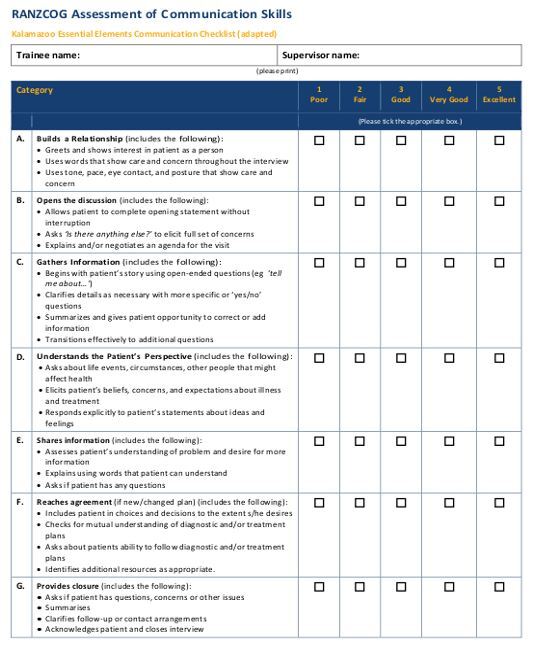
Have candidates rate themselves in the areas testing for soft skills. (Source: Examples.com)
A knowledge pre-employment test can be the most beneficial for you, as it tests the core skills necessary to do the job. You can test in many areas, including spreadsheet or database skills—our free Excel test, for instance, examines jobseekers’ spreadsheet skills. Other areas to test include knowledge of IT, math, typing, and other complex skills that a candidate should possess to perform the job successfully.
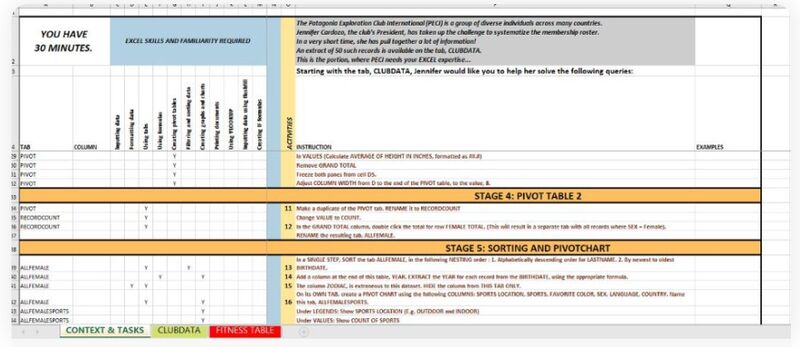
Knowledge assessments can help you understand where a candidate has expertise. (Source: Fit Small Business)
For positions in which a hard skills test may not reveal everything you need to know, try using a real-life example test, wherein you create questions based on events that recently occurred at your company. Like a case study, you can use this to determine a candidate’s ability to take decisive and quick action, comparing it to how you handled the event. It gauges a candidate’s actual job performance through critical thinking.
A cognitive ability test measures how applicants think and approach difficult situations. Oftentimes, it is game-based and timed. While the questions have little-to-no direct correlation to the job duties, the test lets you measure a jobseeker’s ability to think critically about a situation in a timed environment. Especially for people managers or workers dealing with customers regularly, seeing how they react to stressful situations can help you gauge their level of skill and how they would perform in the role.
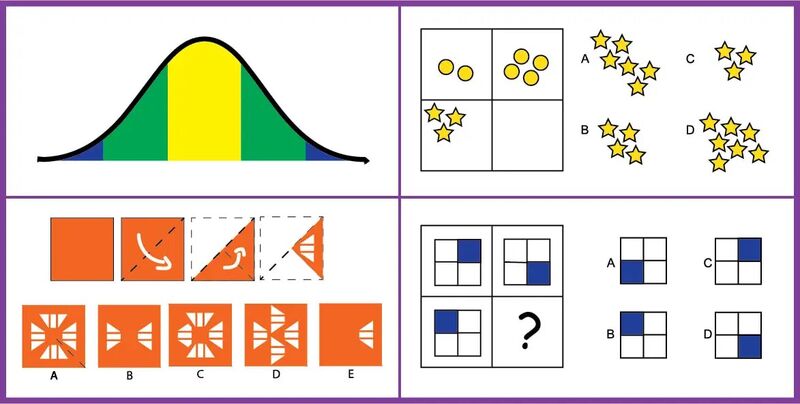
Cognitive ability testing will help you see how the candidate can use logical reasoning to derive the correct answer. (Source: Structural Learning)
Using a personality test is a good approach to determining the style of worker the candidate is and how they relate to other coworkers. These types of tests measure on a scale how an individual handles stressors in their personal and professional life.
Tests like DISC assessments are behavioral assessments that are used to predict job performance. Employees can use these tests to know best how to work with a colleague based on their personality style.
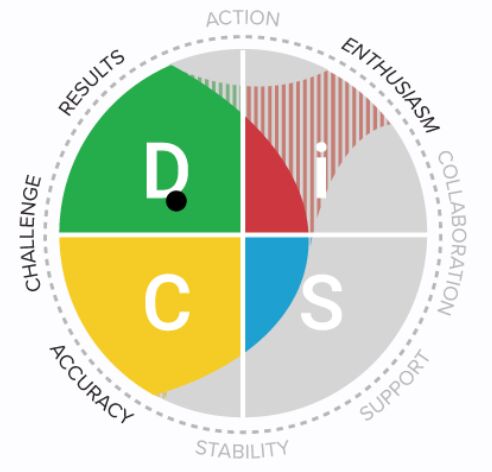
Find out where you fall on the DISC wheel to determine your job performance style. (Source: DISC)
This type of hiring assessment test will judge the candidates’ trustworthiness and their tendency to be honest and dependable. You may want to give candidates an integrity test if they will be handling money for your business, such as an accountant or payroll specialist. It is a personality test—but it takes it a step further to judge how well you can trust this person with your company’s financials.
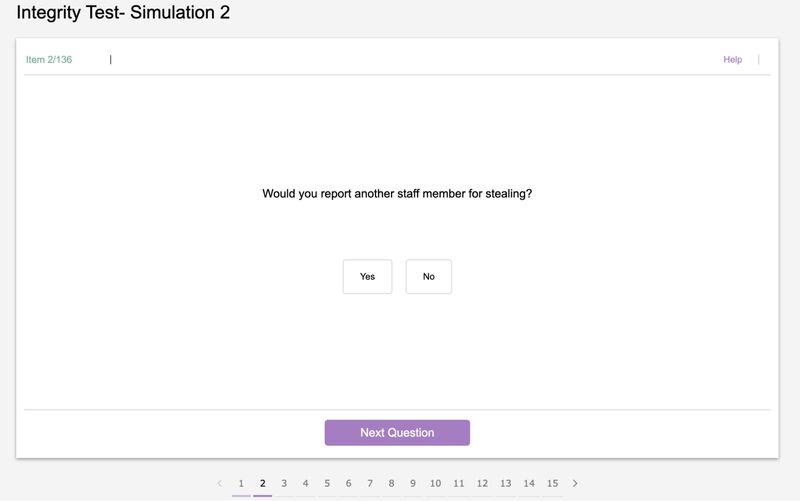
Integrity assessments judge candidates based on how well they handle difficult situations. (Source: JobTestPrep)
Depending on the type of position you are hiring for, you may require your candidates to take an emotional intelligence assessment. This will measure the candidate’s emotional skills related to life and the workplace. It does this by measuring the following:
- Recognition of self-awareness (personal purpose, knowing yourself and feelings)
- Recognition of social awareness (empathy, connecting, resonant leadership)
- Self-management (self-control, managing moods, transformation)
- Relationship management (collaborative conversations, learning, coaching, building teams and alliances)
If you are hiring for a management position, this type of test will help you understand if the candidate has the ability to understand their own purpose, as well as build a strong team.
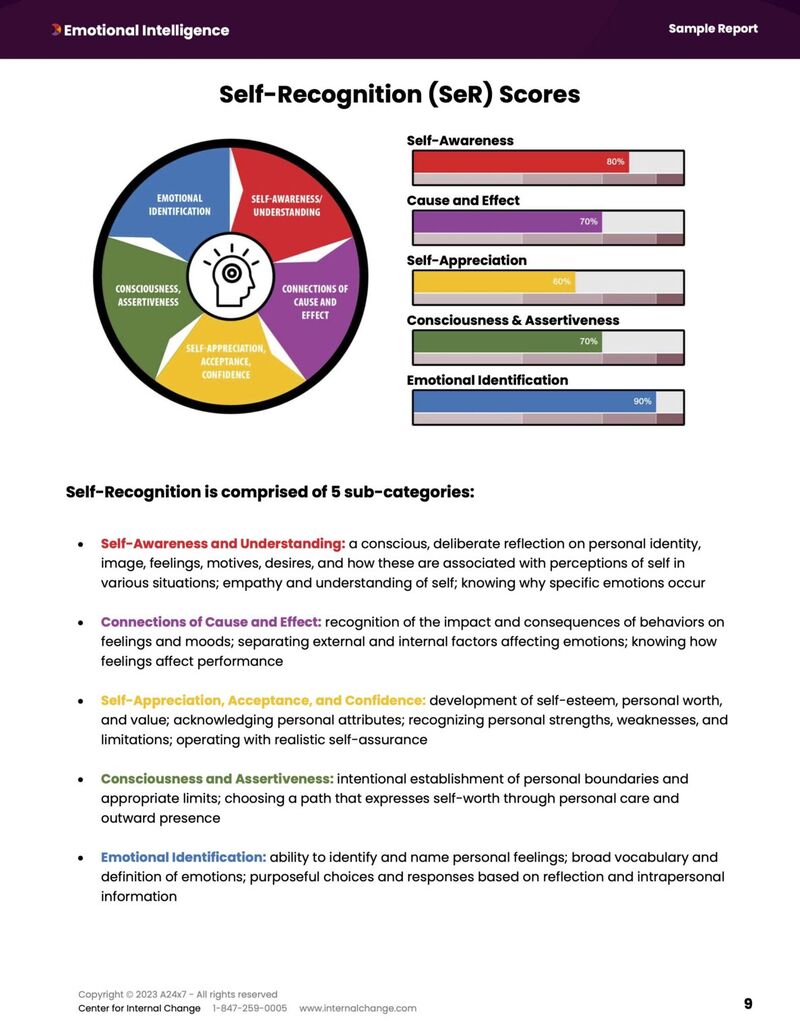
Candidates will rate themselves in areas such as self-awareness, emotions, and motivation. (Source: Center for Internal Change)
You may need to test the physical abilities of a candidate, depending on the type of job they will perform. For example, if you are hiring a construction worker, you may want to test their ability to operate certain equipment. This may fall more in line with on-the-job training; however, if you need someone already skilled to perform the duties without a lot of training, a simple physical ability test may be appropriate.
Be sure to follow employment laws when it comes to testing physical abilities, as it may violate the Americans with Disabilities Act. Check out our guides to employment laws and federal and state labor laws to learn more about the regulations you’ll need to keep in mind when hiring.
We often don’t think about an interview as a pre-employment assessment, but it is, and it’s one of the most effective. When you use a structured interview process, you ask the same targeted questions of each applicant, letting you evaluate everyone based on their answers to the same questions. A good interview can expand on the other prehire assessments and help you dive deeper into a candidate’s ability to do the work and fit into your organization.
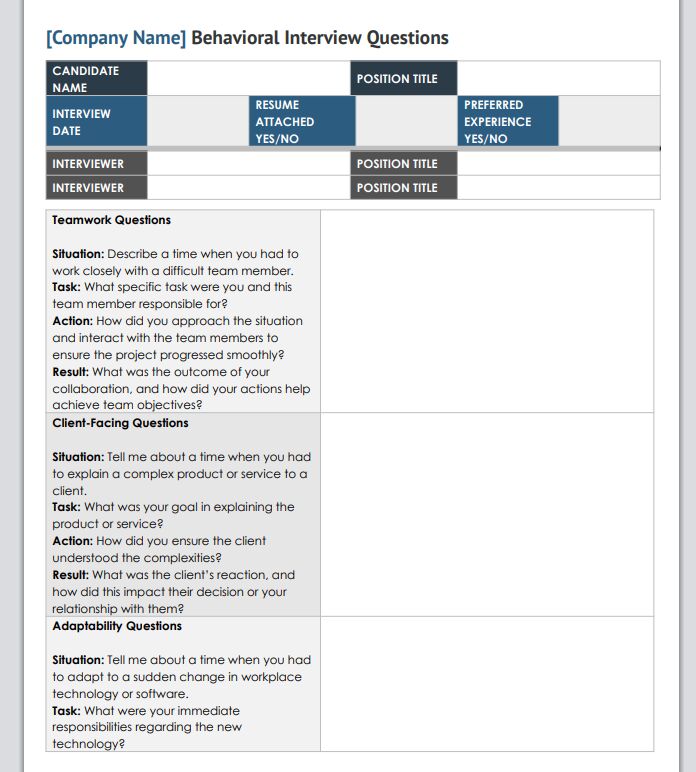
Interview questions can help you determine a candidate’s abilities. (Source: Fit Small Business)
How to Conduct Targeted Skills Assessments
Finding the perfect candidate requires a thoughtful approach in your hiring process. Consider the following steps for adding pre-employment assessments to your process:
Step 1: Determine Which Skills to Test
Think about the position you need to fill. Review the job description closely and extract the half dozen or so most important skills a worker must possess—these are what you need to test. Using the testing options listed above, assess candidates by tailoring the tests and your questions to the specific skills necessary to perform the job successfully.
For an administrative position, you may need to test typing skills or word processing skills. There are many online tests you can use to gauge accuracy and time, giving nearly instantaneous results. For an IT position, however, you may need to test on more intricate computer systems and languages. This could require a specialized test that you build yourself and grade manually.
Step 2: Decide on Test Types
We recommend a combination of at least one pre-employment assessment test plus an interview. This helps you evaluate candidates from different angles and can eliminate anyone who may have been able to cheat their way through the test.
If you’re crafting your own test, keep it to about 10 questions. This doesn’t overwhelm the candidate and won’t take you too long to review. Vary the questions by having some text responses, multiple-choice questions, and analytical questions. We also recommend giving a time limit—but make it reasonable to ensure that you get the best results possible.
Step 3: Assess When & How to Administer the Test
When to send the assessments out depends on the position. If you’re hiring an admin, administering a pre-employment test right after reviewing their resume can be an effective way to screen candidates and only interview the most qualified. For other positions, you may need to conduct a phone screen first, then send a pre-employment assessment test.
Moreover, how you deliver the pre-employment assessment test and how long until you receive the results depend on the exam type. A typing test can be done via a website link, and results are available in minutes. An Excel test, on the other hand, is something you may email to the candidate and get back within two days. The more complex your test and the more detailed your questions, the longer you’ll need to wait for results.
Step 4: Interpret the Results
The outcome of a pre-employment assessment goes into the overall evaluation of the applicant, and your next steps depend on the test’s purpose. If it was a requirement for them to apply, use the results to determine whether to grant them an initial interview. In other cases, you’d have conducted a phone screen before sending the test out, and with the results, you decide whether to move forward with the hiring process.
Conducting interviews allows you to follow up on candidates’ test results with additional and targeted questions to help you gauge their skill level even further. You will also see their reaction and thought process in real-time, giving you insight into whether they truly possess the skills necessary.
Benefits of Pre-employment Assessments
A resume can tell a story about an applicant, but it never gives you the whole picture and doesn’t indicate the proficiency they have with each of their skills. Education used to be a central focus for hiring, as companies expected that if a candidate had a certain degree, that would mean they have a certain level of skill relevant to the job. However, the number of job postings focused on skills and pre-employment assessment is rising, while the number of postings requiring a degree is falling.
By focusing on pre-employment assessments and not just resumes, you can do the following:
- Gauge a Candidate’s Skill Objectively: By using pre-employment assessments, you can objectively and accurately determine a candidate’s skill level.
- Expand the Applicant Pool: Most of the jobs where degree requirements are fading and skills assessments are increasing are mid-skilled positions.
- Reduce the Time to Hire: Using pre-employment assessments can help you screen unqualified applicants by giving you insight into each one’s ability to do the job and fit within your company culture. This also reduces the number of interviews you’ll need to conduct, giving you more time to focus on the most highly qualified candidates.
- Locate Candidates for Other Jobs: Using a pre employment assessment doesn’t always mean you reject job seekers who don’t meet the needs of the role. Sometimes, candidates are overqualified or have skills better suited for another open position. A pre-employment skills assessment can help you identify these applicants and shorten the hiring process for other positions.
- Stay Compliant: When you focus on the assessment, you take bias and subjectivity out of the equation—either the candidate has the skills you’re testing for or they don’t. This makes your hiring process more consistent and objective and less open to legal scrutiny. Check out our article on the most common hiring biases and learn how to avoid them.
Frequently Asked Questions (FAQs)
The best pre-employment assessment is one that tests cognitive abilities. These evaluate a candidate’s problem-solving abilities, logical thinking, and learning styles.
While these tests have a lot of pros to help you determine eligibility for your open positions, there are a few cons to take into consideration. First, answers to some questions may be subjective, leading to inaccurate results. Additionally, the costs involved may be more than small businesses can afford.
Depending on the type of pre-employment test used, you might ask job skill questions, personality questions, analytical skills questions, or aptitude and reasoning questions. Each will give you insights into the candidate’s qualifications and how they may fit into your company culture.
Bottom Line
Pre-employment skills assessments can be a great tool in your hiring process. You shouldn’t rely solely on them to screen candidates, but they can help you narrow your list of applicants down to only the most qualified and get the right person in the seat faster.


